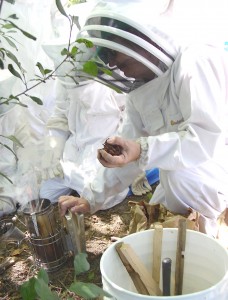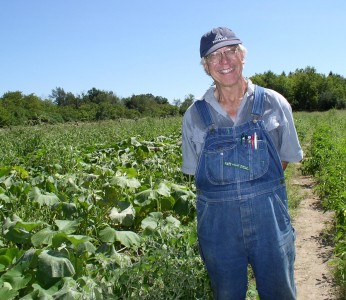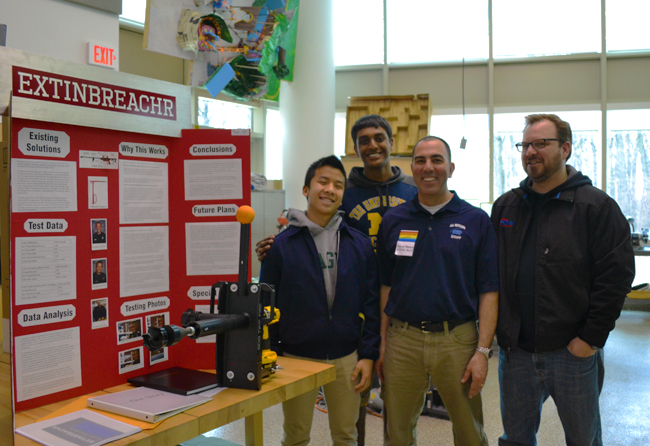Retired Ann Arbor teacher shares her love of beekeeping
A video of student campers visiting Raynor Farm beehives and harvesting honey at Lakewood Elementary:
By Casey Hans
AAPSNews Service
Honey bees dance around a cluster of six hives on Richard Raynor’s family farm in Superior Township. Campers from Ann Arbor’s Rec & Ed’s Green Adventures Camp suit up in head-to-toe protection to experience the hives – and the bees – firsthand.
They are accompanied by retired Ann Arbor Public Schools elementary teacher Jane Levy, who still teaches with the summer camp, and Raynor, whose family has owned the 60-acres farm in Frains Lake since 1936. Both are beekeepers and share their knowledge of life that is teeming in the hives.

“You stay calm and walk slowly,” Levy tells the first group, laying out the rules. “You don’t swat at the bees. You’re going to stand in a “U” behind the hives. You don’t have to worry.”
Both beekeepers use “smokers” lit with kindling, puffing smoke into the hives before opening them and peeking in. “When you smoke them, it slows them down. They think the beekeeper is here,” Levy explains to students.
Raynor, who owns two of the hives on site, said his bees recognize him and he generally wears no protection. He says the bees have their mission and don’t need encouragement to get to work. “Bees pretty much know how to take care of themselves,” he says.
Campers have more fun in store at Lakewood Elementary camp headquarters, where Levy brings honeycombs from the hives and helps youngsters spin out the honey – and get some tasty, free samples.
There are more than 300 unique kinds of honey in the United States, all dependent on the types of nectar bees find and process, according to the National Honey Board. Honey is an all-natural sweetener comprised of natural sugars and water and also has trace enzymes, minerals, vitamins and amino acids. It also has antioxidants; generally, darker honeys have a higher antioxidant content and a more robust flavor than lighter ones.
Levy became enamored with bees while working as an elementary teacher at Ann Arbor Open School @ Mack. In the summer of 2007, she was one of 20 teachers to take an Integrated Beekeeping course through Oakland University’s Apiary Science in Schools program that was funded through the U.S. Environmental Protection Agency. The program included an initial federal grant that provided one hive and full protective gear.
‘It was so much fun, I decided this is what I wanted to do.’
– Jane Levy about her decision to leave the field of science to go into teaching
She started a Bee Buddies program at Ann Arbor Open that fall with about 100 students. She taught each multi-aged first-second grade class (five total classes) and the blended seventh-eighth grade class once each year. The bee education program will continue this school year, Levy said.
Additional grants from the Ann Arbor Public Schools Educational Foundation over the last two years have allowed the program to grow with the purchase of kid-sized beekeeper suits, an extra honey extraction tank and two additional hives. Levy now works with three hives at Raynor Farm, one hive at Ann Arbor Open, an observation hive at the Ann Arbor Hands-On Museum and one in her backyard.
Levy’s interest in science education harks back to her first career: She was a laboratory scientist at the University of Michigan before volunteering in her son’s classroom, when she decided she liked the school setting and made the move into teaching.
“I volunteered in my son’s class (at Wines),” she said. “It was so much fun, I decided this is what I wanted to do.” She taught grades kindergarten through two for 20 years, retiring three years ago.

But retirement appears to be just a word for Levy, who stays busy all year. She took students to visit the beehives throughout the summer as a camp teacher, volunteers during the school year as a guide for Environmental Education field trips and with the Bee Buddies program and also does education programs at the Waterloo State Recreation area.
“It’s definitely what I like to do,” she added. “To continue to make the world a better place.”
In addition to learning about bees, student campers visiting Raynor Farm stay busy harvesting fresh vegetables that they helped to plant and learning to cook and sample freshly picked veggies.
Raynor invites students to his farm property not only during summer camp, but also during the regular school year, when fifth-graders do a Winter Survival program there as part of the district’s Environmental Education curriculum.
For more about Oakland Apiary Science in Schools program including videos and lesson plans visit: www.oakland.edu/apiaryscienceinschools/ Any teachers or schools in Ann Arbor interested in working with Levy and her bee program may contact her at jane.levy@sbcglobal.net or call 734-995-0113.
Casey Hans edits this newsletter for The Ann Arbor Public Schools. E-mail her or call 734-994-2090 (internal ext. 51228.)
About Jane Levy
Jane Levy is a retired Ann Arbor Public Schools elementary teacher and beekeeper who continues to stay busy helping with Environmental Education field trips during the school year, is involved with the Bee Buddies program at Ann Arbor Open School @ Mack and also does programs about beekeeping at Waterloo State Recreation Area. During the past two summers, she has been a teacher in the Ann Arbor Public Schools Green Adventures Camp which includes taking students to working beehives in Superior Township. She entered a career in the classroom in 1988 after working as a laboratory scientist at the University of Michigan. Levy has master’s degrees in Elementary Education and Biochemistry and a bachelor’s degree in Biochemistry. She loves to travel and reading mysteries and thrillers is a passion. She is married to Jerry, also a scientist; they live in Scio Township and have two grown children: Ben, 32, a computer software developer, and Kate, 29, a programmer who studied both computer science and English and also loves to write. The Levys also claim many pets including dogs, cats, fish and numerous other backyard visitors.
••••••••••••••••••••••••••••••••••••••••••••••••••••••••••••••••••••••••••••••••••••••••••••••••••••••••••••••••••
The honey bee: A lesson in efficiency
Approximately one third of all the food Americans eat is directly or indirectly derived from honey bee pollination. A few of the crops pollinated: cucumbers, almonds, carrot seed, melons, apricots, cherries, pears, apples, prunes, plums, seed alfalfa, cantaloupe, seed onions, avocados, kiwi, blueberries and cranberries.
There are three members of a honey bee colony:
- Queen – mother to all the bees in the colony; she is a fertile female.
- Worker – an infertile female that performs the labor tasks of the colony, including feed preparation, guarding the hive, feeding the queens, drones and brood, and heating and cooling the hive.
- Drone – the male that starts out as an unfertilized egg and mates with a virgin queen. No more than 1,000 get the opportunity to mate.
On average, a worker bee in the summer lasts six to eight weeks. Their most common cause of death is wearing out their wings. They travel about 55,000 miles and visit more than two million flowers to gather enough nectar to make one pound of honey.
The peak population of a colony of honey bees is usually at mid-summer and results in about 60,000 bees per colony. A prolific queen can lay up to 3,000 eggs per day.
Source: American Beekeeping Federation
View the 2007 PBS special “Silence of the Bees” about the importance of the bees in our world



